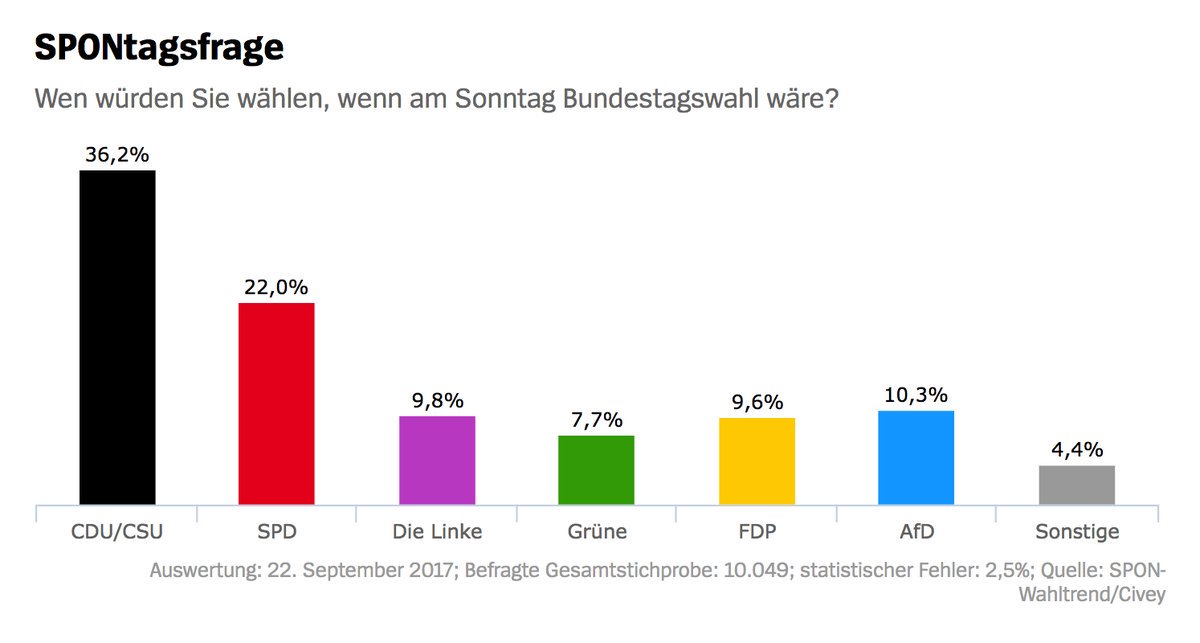Ahead of Germany’s parliamentary election on Sunday, online supporters of the far-right Alternative für Deutschland (AfD) party began warning their voter base of possible election fraud and calling for observers. On Saturday, the eve of the election, their efforts increased, driven by anonymous troll accounts and boosted by a Russian-language botnet.
On the morning of September 22, an apparently left-wing @Twitter user named @von_Sahringen claimed to have been made an election helper, and that as a result, “AfD ballots will be made invalid” — a clear indication of fraud.
The post triggered a swift response from a number of users, including Germany’s official election bureau, which pointed out that election fraud is a punishable offense.
...
Four hours later, the same user tweeted that they had been visited by the police and their status as an election helper revoked.
...
By then, the post had triggered a Twitter storm from AfD supporters, using the hashtag #Wahlbetrug (“election fraud”).
...
The above tweet from user @Hartes_Geld, for example, was shared over 300 times.
However, a quick reverse image search of the @von_Sahringen account suggests that it is a fake account, rather than a genuine user. Its profile picture is a Pakistani actress named Aiza Khan.
Its activity profile is unusual. It was created in February, but, according to a machine scan of its posts, only began posting high quantities in August, in the build-up to the election.
...
The activity indicates a high likelihood this is a fake account pushing a message to provoke a reaction from the far right, and, potentially, to call the legitimacy of the election into question.
...
The #WahlBetrug hashtag was used by AfD supporters throughout the last week of campaigning, but it showed a sudden spike on Saturday afternoon, the eve of the vote. @DFRLab conducted a machine scan of traffic on the tag.
...
The scan shows that the traffic was not organic, but boosted by a network of automated “bot” accounts which operates largely in Russian, and which @DFRLab previously identified in an our #ElectionWatch coverage.
On Saturday, one #Wahlbetrug tweet from an account called @RenateBiller was especially boosted by this network. Posted at noon, it had achieved over 500 retweets by the evening.
This is a spectacular result, since @RenateBiller was created on September 9 and only had 16 followers by September 23.
...
The tweet was amplified by a large number of Russian-language accounts, many of them faceless, a key indicator for bots.
...
The accounts which amplified @RenateBiller’s tweet had a number of other indications of being a network of bots. Many were faceless; they posted a range of commercial and pornographic content in Russian and English, as well as pro-AfD posts and attacks on Russian anti-corruption campaigner Alexey Navalny.
Diagnostically, some of the tweets this botnet shared were also shared by a botnet identifed in one of our earlier posts on German elections, such as this ad for Finnish heated floors and complaint about a Moscow surgical clinic.
...
This is, in fact, the same Russian-language botnet which amplified calls for AfD election observers on Friday. Its continued amplification of the far-right messaging suggests either that the bot manager is an AfD supporter, or that AfD supporters have paid for a Russian botnet to amplify their messaging.
...
More generally, AfD supporters took to social media on Saturday to predict election fraud.
...
This was not limited to bots and troll accounts: official AfD accounts attached to the party’s regional chapters shared content raising the same possibility.
...
The AfD chapter in Osnabrück, meanwhile, shared a call for its members to:
…monitor the counting as an election observer, and then go to the election party. We don’t want our votes to disappear all of a sudden.
https://www.theguardian.com/world/2017/sep/24/german-election-merkel-polls-open-amid-fears-over-far-right-afd-surge
 da SPD samomstalno sastavi vladu CDU moze imati puno problema ako AfD do tada prezivi.
da SPD samomstalno sastavi vladu CDU moze imati puno problema ako AfD do tada prezivi.


 by Zuper Wed Sep 13, 2017 1:06 pm
by Zuper Wed Sep 13, 2017 1:06 pm





